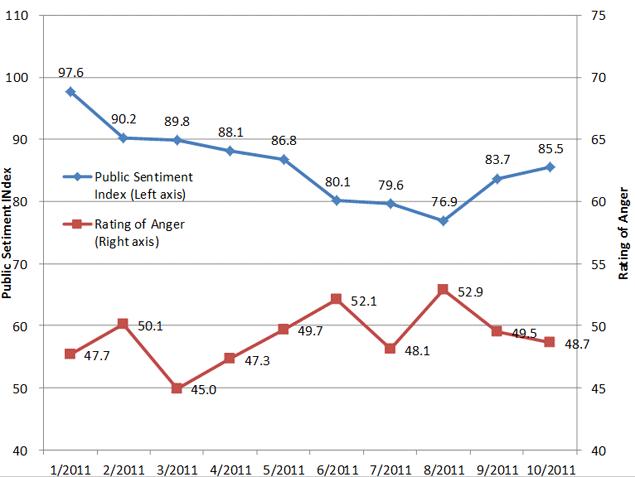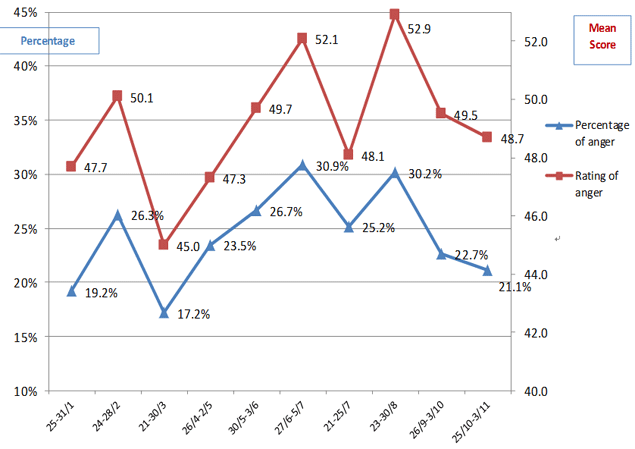"POP-NOW Public Sentiment Index Survey" released for the ninth timeBack
| Press Release on November 14, 2011 | ||||||||||||||||||||||||||||||||||||||||||||||||||||||||||||||||||||||||||||||||||||||||||
|
| Background | Latest Figures | Commentary | | ||||||||||||||||||||||||||||||||||||||||||||||||||||||||||||||||||||||||||||||||||||||||||
Background
Since its establishment in 1991, the Public Opinion Programme (POP) at the University of Hong Kong has been conducting different types of opinion studies on social and political issues, as well as providing research services for different organizations, on condition that POP would design and conduct all studies independently, and could also release the findings for public consumption. In January 2011, POP came into agreement with the "now News Channel" for a project called "Public Sentiment Index". The main objective of the project is to demonstrate, by focusing on ongoing discussions of public sentiment, how independent research institute and professional news media investigate, analyze, report and comment on public opinion, including the explanation and promotion of professional ethics of opinion studies. The project comprises conducting regular opinion surveys and other public opinion studies. The survey results will first be released in the "now News Channel", followed by POP press releases for public consumption. "now News Channel" agrees to POP uploading these programmes to the POP Site for public education, while POP agrees that "now News Channel" uses these findings for productions without POP's involvement. This is the ninth release of the survey series, the last one was released on October 10. Please cite the source of the figures when using them.
| ||||||||||||||||||||||||||||||||||||||||||||||||||||||||||||||||||||||||||||||||||||||||||
Latest Figures The latest survey findings released by POP through now News Channel today have been weighted according to the provisional figures obtained from the Census and Statistics Department regarding the gender-age distribution of the Hong Kong population in 2011 mid-year. Herewith the contact information for the latest survey:
| ||||||||||||||||||||||||||||||||||||||||||||||||||||||||||||||||||||||||||||||||||||||||||
I. Overall ratings of society's conditions and level of anger
[3] Such changes have gone beyond the sampling errors at the 95% confidence level, meaning that they are statistically significant prima facie. However, whether numerical differences are statistically significant or not is not the same as whether they are practically useful or meaningful.
| ||||||||||||||||||||||||||||||||||||||||||||||||||||||||||||||||||||||||||||||||||||||||||
II. Incidents affecting public sentiment Over the past 3 months, what incidents in Hong Kong society made you feel angry? (ask those who self-reported "angry", open-ended question, multiple answers allowed) [5]
[5] The question asked only those who said they were "angry", but all percentages shown are based on overall sample. [6] Such changes have gone beyond the sampling errors at the 95% confidence level, meaning that they are statistically significant prima facie. However, whether numerical differences are statistically significant or not is not the same as whether they are practically useful or meaningful.
Over the past 3 months, what incidents in the Hong Kong society made people angry? Results show that a respective of 5% of the overall sample mentioned "Arguments about foreign domestic helpers' right of abode" and "High property price/housing problems". Other answers include "Radical movements by some Legislative Councillors like Wong Yuk-man and Leung Kwok-hung" (4%), "The Policy Address" (3%), "Stephan Sui-lung Lam becoming the Chief Executive for Administration" (3%) and so on. Moreover, results showed that 31% of the sample would describe themselves as "angry" while 62% describe themselves as not "angry" toward the appointment of Stephan Sui-lung Lam becoming the Chief Executive of Administration. | ||||||||||||||||||||||||||||||||||||||||||||||||||||||||||||||||||||||||||||||||||||||||||
III. The satisfaction level of social conditions The satisfaction rate towards the current social conditions:
[8] Collapsed from a 5-point scale. The mean value is calculated by quantifying all individual responses into 1, 2, 3, 4, 5 marks according to their degree of positive level, where 1 is the lowest and 5 the highest, and then calculate the sample mean. [9] Such changes have gone beyond the sampling errors at the 95% confidence level, meaning that they are statistically significant prima facie. However, whether numerical differences are statistically significant or not is not the same as whether they are practically useful or meaningful.
| ||||||||||||||||||||||||||||||||||||||||||||||||||||||||||||||||||||||||||||||||||||||||||
IV. Integrated Public Sentiment Index The integrated public sentiment index is composed of people's satisfaction towards the governance and social livelihood. It aims at using a simple figure to represent people's sentiment. The following is the integrated public sentiment index since January 2011:
The finding shows that, on a scale of 0-200 marks, the latest "Integrated public sentiment index" is 85.5 marks. The following is the trend of the "Integrated Public Sentiment Index" and "Rating of anger" since January 2011: Chart II: Trend of "Integrated Public Sentiment Index" and "Rating of anger" 
| ||||||||||||||||||||||||||||||||||||||||||||||||||||||||||||||||||||||||||||||||||||||||||
Commentary Note: The following commentary is extracted and enhanced from the comments made by the Director of Public Opinion Programme Dr Robert Chung on November 14, 2011 in the "now News Channel" programme "News Magazine", in the "now Survey on Public Sentiment Index" segment. Some questions and answers are provided by POP. Question: What is the latest trend of the public grievance figures? Answer: The latest survey seems to show that public grievance is subsiding after reaching its peak in late August. This includes public's overall satisfaction with the social condition, their level of anger, as well as their satisfaction towards the political, economic and livelihood conditions. The District Council election did not raise people's grievance, while angers caused by Stephan Lam's promotion to become the Chief Executive of Administration was also not serious. Question: Can these figures help interpret the results of the District Council election? Answer: The survey shows that public grievance did not grow as District Council elections drew near. This means that the market for radical movements is not prominent and it seems to have predicted the defeat of the radical groups. Moreover, since there was no political issue at that moment, the controversy over foreign domestic helpers' right of abode became the central issue. This also seems to have predicted the set back of political groups who sided with the domestic helpers. In a way, this sign was already revealed when we released our ratings of legislative councilors a few days before the election. Question: The latest Public Sentiment Index is 85.5 marks, what does this mean? Answer: The "norm" for the Public Sentiment Index is 100 marks and 85.5 marks belongs to the lowest 15%. In other words, using the past 20 years as the reference period, such a low number only occurs once in 7 times and the government has to be careful in handling this. The SARG is now at its lows in terms of popularity, while the Chief Executive election is about to begin. The government can fall into a governance crisis any time, so it must be very careful during this transitional period. | ||||||||||||||||||||||||||||||||||||||||||||||||||||||||||||||||||||||||||||||||||||||||||
|
| Background | Latest Figures | Commentary | | ||||||||||||||||||||||||||||||||||||||||||||||||||||||||||||||||||||||||||||||||||||||||||








